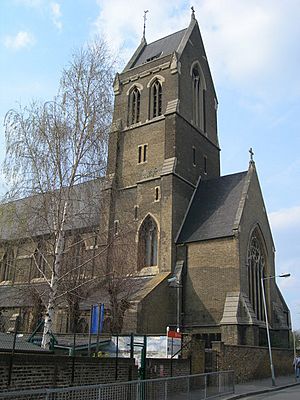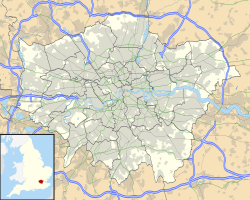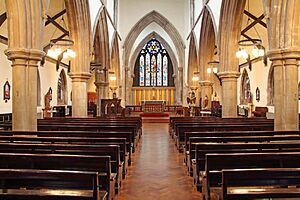St Matthias' Church, Stoke Newington facts for kids
Quick facts for kids St Matthias Stoke Newington |
|
|---|---|

St Matthias Stoke Newington, London N16
|
|
| 51°33′09″N 0°04′46″W / 51.5526°N 0.0794°W | |
| Location | Wordsworth Road, Stoke Newington, London N16 |
| Country | United Kingdom |
| Denomination | Church of England |
| Tradition | Anglican |
| Website | The Church of England: A Church Near You. St Matthias Church Stoke Newington |
| History | |
| Founded | 1849 |
| Dedicated | 1853 & rededicated 1954 |
| Architecture | |
| Architect(s) | 1/. William Butterfield; 2/. Nugent Cachemaille-Day |
| Style | Free Gothic |
| Years built | 1851-53-83 & c. 1952-55 |
| Administration | |
| Parish | St Matthias Stoke Newington |
| Deanery | Hackney |
| Archdeaconry | Hackney |
| Episcopal area | Stepney |
| Diocese | Diocese of London |
| Province | Canterbury |
St Matthias' Church is a very important and beautiful church located in Stoke Newington, a part of north London, England. It's a Church of England church, which means it's part of the main Christian church in England. This church is so special that it's a Grade-I listed building. This means it's considered one of the most important historic buildings in the country. Since it first opened, St Matthias' has been known for its 'High Church' style of worship. This means its services often include more traditional ceremonies, music, and decorations.
Contents
History of St Matthias' Church
The area around St Matthias' Church became its own special church district, called a parish, in 1849. This new parish was created from parts of Stoke Newington and another area called Hornsey. The person or group responsible for choosing the church's leaders, called the clergy, would switch between the King or Queen and the Bishop of London.
Building the Church
The amazing church building was designed by a famous architect named William Butterfield (1814–1900). It was finished and officially opened in June 1853. A lot of the money for building the church came from a rich local surgeon, Robert Brett (1808–74). Mr. Brett was worried because many other types of Christian churches, called Dissenting chapels, were becoming very popular. He felt that the local Church of England buildings were not big enough for the fast-growing population.
The church became known for its beautiful singing and music. The organist, William Henry Monk, helped create the musical services. He was also the music editor for a famous hymn book called Hymns Ancient and Modern. He even wrote the music for the well-known hymn "Abide with me".
Challenges and Changes
Under the leadership of Reverend Charles James Le Geyt, the church's 'High Church' style of services caused some strong disagreements. This style, sometimes called ritualist, meant the services had more ceremonies and traditions. In October 1867, a large crowd gathered outside the church to protest. People shouted at the vicar during the service. After the service, the crowd grew even bigger, and some churchgoers were treated roughly. The crowd then tried to go to Mr. Brett's house, but the police stopped them.
Later, after another protest in London Fields, a big crowd walked towards St Matthias' Church. One person even wore a cardinal's hat, shouting things like "Attack the Church" and "Down with St Matthias." A large group of police officers, with many more ready to help, were outside Le Geyt's house. The crowd eventually left, but not before making loud sounds of protest against Le Geyt's 'High Church' ways.
War Damage and Rebuilding
During the Second World War, the church was hit by bombs from the air. This caused a lot of damage. All the beautiful decorations inside, the stained-glass windows, and the furniture were destroyed. Even parts of the brick and stone ceiling in the chancel (the area around the altar) were ruined.
The church was rebuilt after the war. It officially reopened in 1954. The architect who designed the rebuilding was Nugent Cachemaille-Day (1896–1976). After the war, the responsibility for choosing the church's leaders was given to the Corporation of London.
In 2022, the church also started hosting performances by musicians, showing it's still a lively place in the community.
About the Current Church Building
The church building has a very unique look. It is made of special yellow bricks, called stock brick, with decorative parts made of Bath stone. The roofs are covered with slate. The main part of the church, called the nave, is very tall and has five sections. It has lower side areas, called aisles.
One of the most striking parts of the building is the tower in the middle, which has a special "saddleback" roof shape and very long openings for the bells. Inside, this tower creates a very tall arch leading to the chancel. The church's windows have a special design called tracery, which is a creative version of a late Decorated style.
The church is currently undergoing repairs to keep it in good condition. These repairs are paid for by the church community, with help from the Heritage Lottery Fund and Historic England.
Images for kids
 | Chris Smalls |
 | Fred Hampton |
 | Ralph Abernathy |





